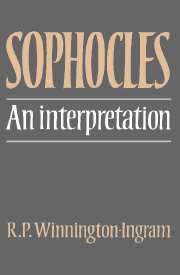Book contents
- Frontmatter
- Contents
- Preface
- Bibliography of short titles
- 1 Introductory
- 2 The mind of Ajax
- 3 The burial of Ajax
- 4 Trachiniae
- 5 Sophocles and the irrational: three odes in Antigone
- 6 Creon and Antigone
- 7 Fate in Sophocles
- 8 The fall of Oedipus
- 9 Furies in Sophocles
- 10 Electra
- 11 Oedipus at Colonus
- 12 Philoctetes
- 13 Heroes and gods
- Appendices
- Select index
8 - The fall of Oedipus
Published online by Cambridge University Press: 07 December 2009
- Frontmatter
- Contents
- Preface
- Bibliography of short titles
- 1 Introductory
- 2 The mind of Ajax
- 3 The burial of Ajax
- 4 Trachiniae
- 5 Sophocles and the irrational: three odes in Antigone
- 6 Creon and Antigone
- 7 Fate in Sophocles
- 8 The fall of Oedipus
- 9 Furies in Sophocles
- 10 Electra
- 11 Oedipus at Colonus
- 12 Philoctetes
- 13 Heroes and gods
- Appendices
- Select index
Summary
The Second Stasimon holds a central position in Oedipus Tyrannus. It follows the elaborate preparatory scenes and immediately precedes the rapid march of the action towards its catastrophe. The ode is difficult to understand and has been variously interpreted.
We expect a Sophoclean Chorus to react to the preceding episode; and the themes of this ode are indeed related to the long scene that has just been played. Interpreters are not agreed, however, on the precise character of this relationship, except in one particular. It is abundantly clear that the fourth stanza (898–910) relates to the scepticism on the subject of oracles and prophecy which was expressed by Jocasta at the end of the preceding scene. The concern of the Chorus arises, however, not so much from the fact that she expresses a sceptical view which might be thought shocking as from the grounds on which her view was based. On the face of it, and on the facts as stated, an oracle given by Loxias at Delphi has failed, once and for all, to be fulfilled. They feel that, unless facts and prophecy are shown to be in full agreement, this will be the end of oracular authority and the end of religion (if that is how we should translate τὰ θ∈ῖα); and they pray to Zeus the supreme king to give the matter his attention. It is the facts – the apparent facts – that cause their concern. But, when in the first stanza they sing about reverent purity of word as well as of deed, it is commonly – and I think rightly – held that they have in mind, among other things, the impious words of Jocasta.
- Type
- Chapter
- Information
- Sophocles: An Interpretation , pp. 179 - 204Publisher: Cambridge University PressPrint publication year: 1980
- 2
- Cited by



